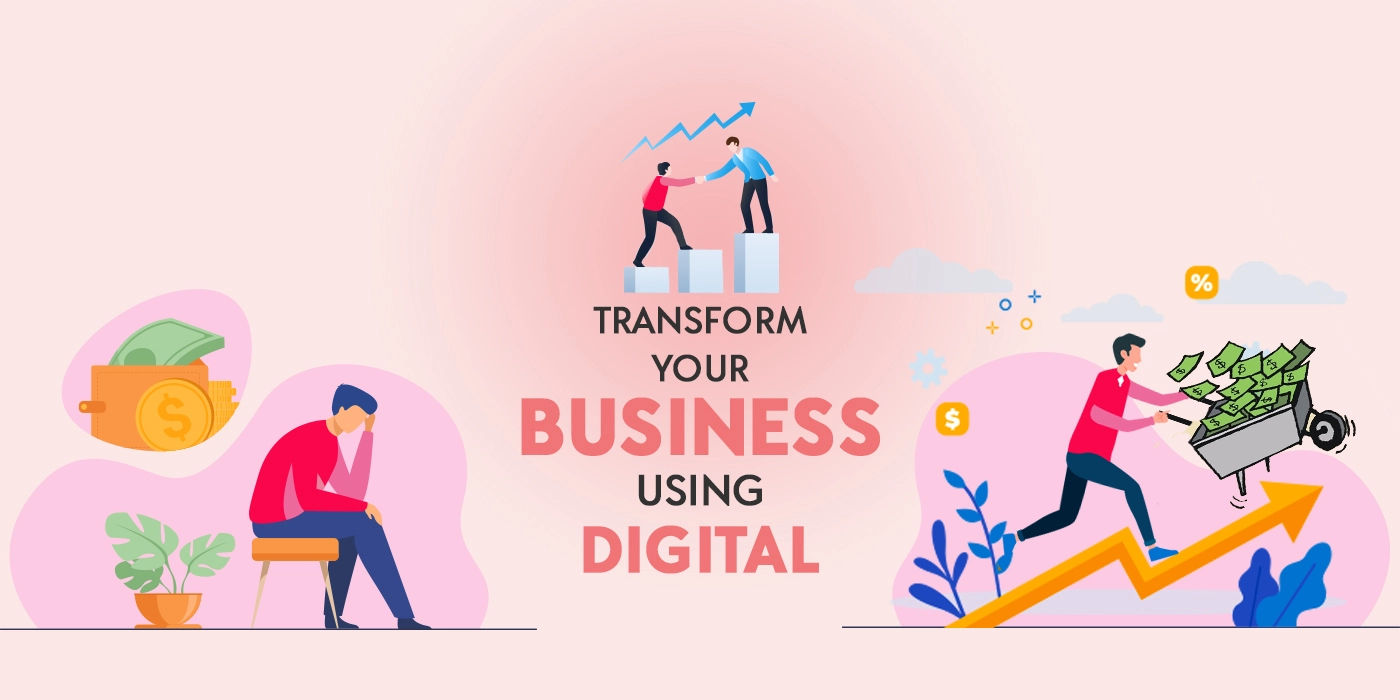Digital Transformation

This article is a brief take on the concept of digital transformation and its impact on modern-day business operations & digital marketing/sales. It helps the reader understand the niche's various aspects, including its role in BIS, MIS, ERP, and automation techniques. The post also observes the pandemic's effect on the domain and the future direction of digital transformation.
What Is Digital Transformation?
Digital transformation is simply adopting information technology to transform your business processes. The integral consideration of note is the application of digital technology platforms & techniques to all elements of your business. It will bring a synchronous advantage to your operations, delivery, and value-addition for customers.
The working process of digital transformation is essentially a systematic method of defining your business goals in a new light. The initial step is to possess an understanding of your business's current situation. It will help you analyze the depth & clarity of required digital transformations, including the very need.
Ensure that all the parameters within your organization, like leadership, technology, operations, work culture, and customer experience, are a part of the transformation considerations. The next step is to create a strategic plan to achieve the transition in place, keeping the objectives & insights intact.
Once you have a solid plan in its foundation, proceed with changing the status of your transformations in the up & running direction. You have to enable the investment channels for the appropriate personnel & skills to derive maximum value and returns.
Digital Transformation In Marketing & Sales
Digital transformation contributes vastly to the marketing and sales segments, especially in the B2B sector. The buyer journey and the customer persona have evolved to a significant level of automation following online resource allocation. The primary perspective in adopting digital transformation in sales & marketing is to gather and deliver value relying on informative target content.
The process is easier to explain by referring to the two scenarios below:
ECommerce
The scope of digital transformation extends to a broad array of platforms, devices, and digital assets. ECommerce is no exception. The best way to influence the concept in the eCommerce industry is by recognizing the role of customer expectations in the online realm. It enables your business to digitize numerous products & service offerings by engaging an optimum strategy of digital efficiency.
Sales Without ECommerce
Future sales will arrive at a point of impossibility without eCommerce optimization. The sector needs to try to improve its strategy on the consumer front. The direct impact of digital transformation will hugely reflect on the retail section. Some of the default changes for your business in this category are the continuous disruption in API services, adoption of alternative payment methods, and implementation of innovative technology solutions.
Digital Transformation In Business Operations
This section helps you determine the adequate contribution of digital transformation in various business operations with an onus on business information systems, management information systems, and enterprise resource planning.
BIS/MIS
Business Information Systems & Management Information Systems are two top-tier techniques that find significance in digital transformation for any online business process. In BIS, business infrastructure and decision-making entities achieve maximum organizational potential.
MIS allocates the technology, personnel, and business processes in a synchronous mode to assist in information & productivity analysis plus critical decision-making for organizations. Both BIS & MIS are directly proportional to the digital transformation methodologies in your business environment.
ERP
ERP software and technology play an integral role in raising the bar of your digital transformation and its operation patterns. The various phases of your business that ERP can drive involve cleansing data, standardizing services, understanding the buyer journey, and working on actionable insights. All these elements add worth to your present digital transformation concerns.
The top ERP modules contributing to the maximum efficiency & potential for your business are in the categories of accounting/finance, CRM, HR, inventory, and marketing management. ERP integrations in digital transformation help financial management by using factors like organizational agility, risk assessment, technology collaborations, and digital disruptions.
Customer relationship management tools & resources gain sufficiently in the digital transformation phase. They help increase confidentiality, communication, and collaboration culture in your organization. The process of optimization is guiding the human resources department in multiple areas like onboarding, self-service portals, personnel analytics, tracking systems, chatbots, and digital adoption portals.
Digital transformation helps improve the effectiveness of different product types & goods within any business. It adds to the inventory management and optimization within your entity. Marketing automation functions take a positive stride by using digital transformation processes. It helps you strategize, optimize, commit, embrace, and seize marketing opportunities.
Impact Of Covid
The recent pandemic has impacted multiple business sectors significantly. Covid's role in the digital transformation process is the constant acceleration of all the online business components. The pandemic gave rise to new trends in digital resources & a potential increase in establishing the fourth industrial revolution technologies.
In the initial phases of the pandemic, organizations across the world were off-guard, limiting their productivity. The idea and effectiveness of digital transformation changed the game in a favorable direction for businesses. The crisis allows a boost in the digitization of these businesses keeping the economy stable.
Experts expect the post-pandemic era to continue with the constant evolution of digital transformation processes & will cause redefining of the entire concept consistently.
Digital Transformation & Automation/AI/Machine Learning
The term digital transformation and its influence on business activities will not be complete without discussing the application on various sub-niches. They include automation techniques, Artificial Intelligence (AI) & Machine Learning (ML).
Automation is the end-to-end technology that drives efficiency and transparency in business concepts. It helps organizations disregard the need for manual flow of operations. The keyword in creating optimal value for digital transformation is employing process automation steps in the organizational workflow. It is crucial not just for IT businesses but companies in numerous sectors & industries.
AI is capable of providing an advanced take on standard automation tools. Your complex business tasks and well-defined organizational measures will reach a unique design structure by integrating AI into the mix. AI is crucial to digital transformation and focuses on your business growth by merging with cloud technologies & predictive models.
Machine Learning is a popular subcategory of AI & is valuable to your digital transformation plans. The real-world applications of MI are at their tactical best when dealing with data interpretation, business process optimization, and user experience.
Future Of Digital Transformation
Though the pandemic fast-tracked adoption of digital transformation, the practical requirements of modern businesses will place the subject back in its right relevant spot. The future looks bright for this exciting strategy and will find vital application in the below sectors:
The finance sector will get a boost with an incredible business intelligence platform. Organizational operations will improve in a steady automation flow, empowering general business functions. Productivity and output measurement in companies will raise the bar using digital transformation techniques. The concept of deliverables in your organization will follow a strict, dynamic workflow, ensuring customer fulfilment in return. The revenue generation and profit evaluation statements will adapt a credible process for all businesses owing to digital transformation.
Wrapping Up
Remember that digital transformation is a continuous process with no shortcuts. Once you join the bandwagon, it is only appropriate that you prepare the whole organization to produce results in the exact streamlined direction.

